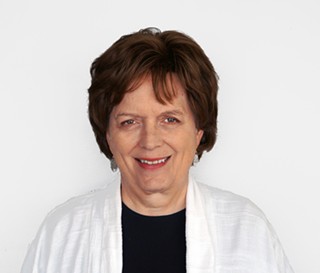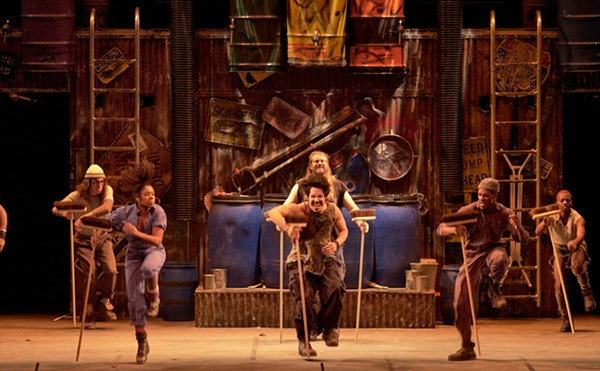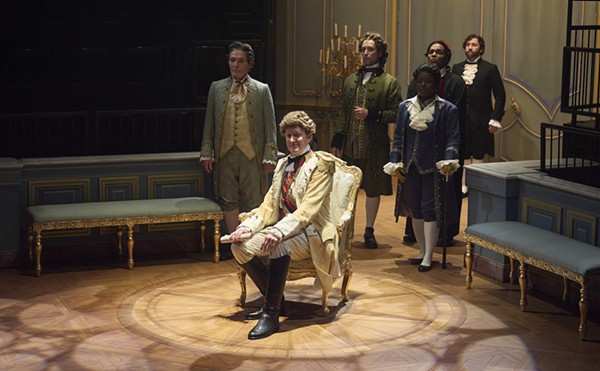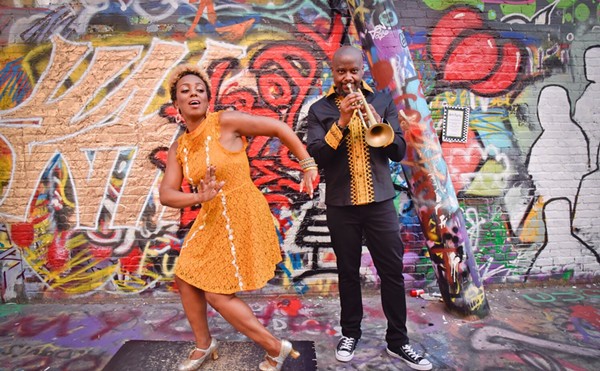In Shakespeare plays, the clowns and noblemen are separate characters. But in Eugene O'Neill's The Iceman Cometh, virtually each drunken character is foolish and wise, pitiable and exalted. And that is why this play is so wondrous to behold.
Fortunately, it is being given a remarkably fine presentation at Ensemble Theatre, directed with fluidity by Ian Hinz on Ron Newell's gorgeously lived-in set, with an array of more than 15 actors who often occupy the stage together.
There are rough edges, particularly towards the end of the marathon 4-hour run time, due to the repetitive script and a performance bobble or two. But this is a rich sampling of epic American theater that cometh to town rarely.
The scene is Harry Hope's bar, a dark and dank yet welcoming place for its inebriated denizens. It's an intergenerational resting place for people who have taken Annie's musical anthem to heart: they love tomorrow, because tomorrow never comes.
Relying on their dreams of how things will change the next morning, these down-and-outers drown themselves in booze, propping up each other's sad little fantasies so they can pass out and awake to do it all over again. You know, kind of like life (if you wish, replace booze with the lifestyle opiate of your choice).
On this particular evening, everyone is eagerly awaiting the arrival of Theodore Hickman, the traveling salesman who always stops in to celebrate Harry's birthday. Loaded with jokes and a fat bankroll, "Hickey" is akin to a god for this besotted crew.
Hickey's one apostate is Larry Slade, a former movement anarchist who pities his drinking pals for their pipe dreams. And even though he is being tormented by young Don Parritt, the son of Larry's former girlfriend, Larry stands ready to challenge Hickey and his palaver.
But once Hickey arrives he quickly tosses cold water on this low-rent bacchanal by announcing he's off the sauce. Moreover, he's going to relieve his pals of their pipe dreams by forcing them to sober up and act on their futile hopes, so they can put away those illusions and be at peace with themselves.
This results in bold forays outside the bar and then Hickey's eventual unraveling, which comprise the shattering yet oddly triumphant conclusion of this piece.
There are many standouts in the smaller roles: Bobby Williams' mellow and then intense Joe Mott, Allen Branstein's tough/tender night barkeep, and Mitch Rose's Willie Oban who is a symphony of smart-ass putdowns and cowering fear.
Also excellent are Tyler Whidden as Ed Mosher former circus roustabout; Chris Bizub as the perpetually comatose but sporadically bellicose Hugo Kalmar; and Valerie Young, whose frayed at the seams Cora is a nice match with her dead-end squeeze, Aaron D. Ellersich's stoic Chuck Morello.
The heart of this insular bar "town" is represented exceptionally well by Michael Regnier as Hope, a man who complains bitterly about the freeloaders around him even as he passes out the drinks. And James Rankin has a nice-irritating edge to his characterization of Parritt, even if he rushes some beats along the way.
Robert Hawkes, as the death-fearing iconoclast Slade, establishes firm footing for his truth-telling character and provides the necessary ballast to Hickey.
In the prime role of Hickey, the accomplished actor Dana Hart is a breath of fresh air when he strides into the bar, using Hickey's formidable drummer skills to connect with his old friends. This makes his turn, when he starts stripping those same folks of their protective illusions, even more devastating.
But in the final monumental monologue, when Hickey spells out the truth about himself and his wife Evelyn, Hart's usually reliable timing and performance chops seem to fray. Delivering this speech with head bowed, he doesn't share his torment with the audience, leaving us a bit disconnected.
What does connect is the idea that we all need our dreams, impossible or not, because getting through the day—even in a dark bar—is no walk in the park.













